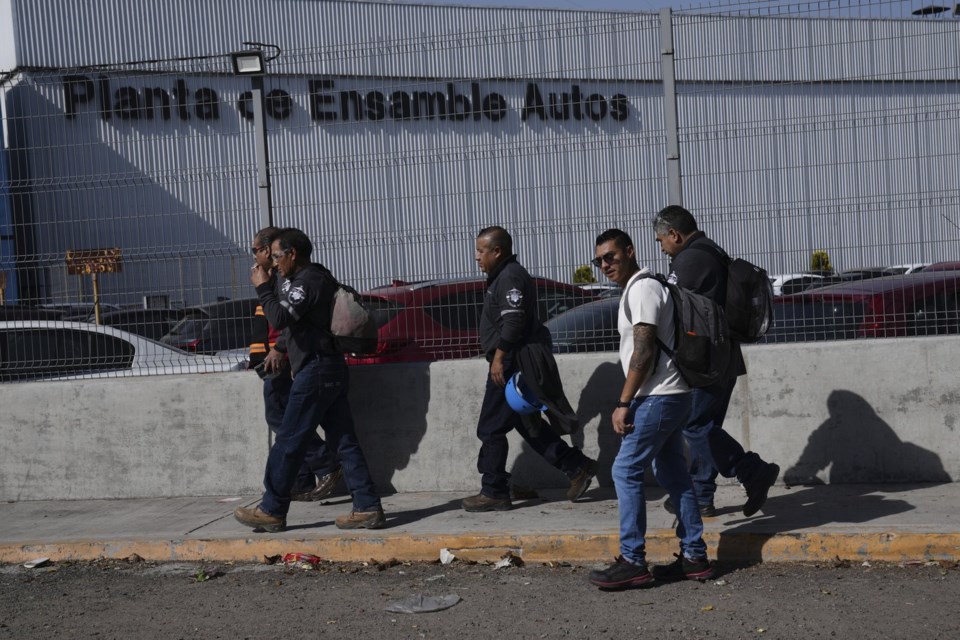TOLUCA, Mexico (AP) — Auto workers voiced uncertainty and hope outside a Stellantis assembly plant in central Mexico that was scheduled to begin a month-long pause in production Friday as the maker of brands including Jeep and Ram assesses the potential impact of the latest U.S. tariffs on its operations.
The company had announced Thursday that it would pause production at the plant in Toluca, as well as another one in Canada. The pauses would lead to 900 temporary layoffs at plants in Michigan and Indiana.
U.S. President Donald Trump announced 25% tariffs on auto imports last week, but since Mexico has a free trade agreement with the United States and Canada, it believes it can get almost all of its auto production exempt under the agreement.
Mexico dodged what the White House called “reciprocal” tariffs on dozens of trading partners around the world on Wednesday.
On Thursday afternoon, workers arriving for their shift and some leaving the Stellantis plant said the company had not yet informed them of the plans.
Mexico President Claudia Sheinbaum on Friday downplayed the company’s announcement, saying her economy secretary had spoken with the company.
“They are not thinking about reducing the jobs,” Sheinbaum said. “It’s a temporary stoppage to be able to evaluate the current conditions.”
She said the company had explained that one of their electric vehicles already wasn’t selling well, and now, with the tariffs, it would study whether it would continue manufacturing the vehicle.
The president added that Swedish car maker Volvo had said Thursday that it was going to increase production at its plant in the northern state of Nuevo Leon.
A Stellantis official, who requested anonymity because they were not authorized to comment, said that the stoppage in Toluca would run from April 4 to May 4. Additionally, a Stellantis plant in Saltillo in the northern border state of Coahuila paused production March 31 for about two weeks, the person said.
There were no plans for layoffs at the Mexico plants. Workers would do training and maintenance during the stoppages, the Stellantis official said.
José Emilio, a 31-year-old worker at the Toluca plant who gave only his first names for fear of retaliation, said he was worried as he headed in for his shift. He said he heard about the company’s plans to pause production on the news and worried that the U.S. tariffs could lead to job loss in Mexico.
But Eduardo Jiménez, 53, who has worked at the plant for 35 years, said he has seen his share of ups and downs and believes Mexico’s auto industry will survive Trump’s tariffs.
“We’ve gone through a lot of previous crises,” he said as he left the plant.
The auto sector is critical in Mexico, generating nearly one million jobs and representing around 5% of the gross domestic product and 32% of Mexico’s exports.
Last year, Mexico exported 87% of the nearly 4 million vehicles it produced to the United States.
Isidro Morales, a political science professor specializing in North American integration at the Meritorious Autonomous University of Puebla said that Mexico will try to make the U.S. respect the terms of the free-trade agreement, which Trump signed during his first presidency.
Sitting on the sidewalk outside the plant waiting for his shift to begin Thursday, auto worker Sergio Rodríguez, 40, said he was confident that Sheinbaum would reach a deal with the U.S. to avoid the tariffs. “They’ll talk to each other and come to an agreement,” he said.
__
AP writer María Verza in Mexico City contributed to this report.
____
Follow AP’s coverage of Latin America and the Caribbean at https://apnews.com/hub/latin-america
Fabiola Sánchez, The Associated Press



